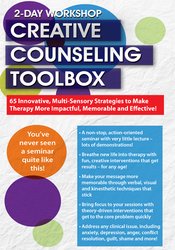

Tired of using the same interventions, session after session? Do you find yourself repeating the same phrases and concepts over and over, wondering how much of it is getting through to your clients? Are your sessions unfocused or lacking theoretical basis? Looking to revitalize your practice?
Watch Drs. Ed Jacobs and Christine Schimmel as they introduce you to a whole new framework for treating clients – an active, creative, multisensory, theory-driven approach that grabs clients’ attention and gets them moving in every sense of the word.
Take your interventions to the next level using affordable, everyday items such as chairs, rubber bands, white boards and other props, to have a lasting impact on clients’ insight, motivation and desire to change.
Built on concepts from evidence-based theoretical approaches such as REBT/CBT, Reality Therapy and Motivational Interviewing, these interventions are designed for all age groups and any clinical issue, including mood and anxiety disorders, anger, low self-esteem and relationships difficulties.
Watch this recording packed with non-stop action, demonstrations and ideas that will have you furiously taking notes as your clinical toolbox overflows with creative, effective interventions you can use immediately!
What’s more, you’ll leave inspired to create even more!
| File type | File name | Number of pages | |
|---|---|---|---|
| Manual - Creative Counseling Toolbox (2.43 MB) | 34 Pages | Available after Purchase | |
| Manual - Creative Counseling Toolbox - French (2.43 MB) | 34 Pages | Available after Purchase | |
| Manual - Creative Counseling Toolbox - Italian (2.43 MB) | 34 Pages | Available after Purchase |
Ed Jacobs, PhD, LPC, is the coordinator of the masters’ program in the counseling, counseling psychology, and rehabilitation department at West Virginia University. Professional publications include 30 articles in books and journals as well as six books on counseling techniques: Impact Therapy, Creative Counseling Techniques: An Illustrated Guide, Impact Therapy: The Courage to Counsel, Group Counseling in Correctional Settings, How to Select and Apply Change Strategies in Groups (Group Work Practice Kit), and Group Counseling: Strategies and Skills.
Ed has been recognized for his outstanding teaching and contribution to the field. In 2006, he was given the Outstanding Teacher Award in his college. Also in 2006, he was given by the Association for Creativity in Counseling, the Innovator of the Year Award. In the past he was recognized for his contributions in group work by being given the Professional Advancement Award and selected as a Fellow in the Association for Specialists in Group Work.
Ed is a licensed professional counselor and has maintained a private practice for over 35 years. He has presented Impact Therapy in China, Australia, New Zealand, Turkey, Indonesia, Germany, Andorra, and Canada.
Speaker Disclosures:
Financial: Dr. Ed E. Jacobs is an Associate Professor at West Virginia University. He maintains a private practice. Dr. Jacobs receives a speaking honorarium from PESI, Inc.
Non-financial: Dr. Ed E. Jacobs has no relevant non-financial relationships to disclose.
Christine Schimmel, Ed.D., LPC, is the assistant department chair and the coordinator of the school counseling master’s program at West Virginia University. She serves on the counseling licensure board for the state of West Virginia and was on the task force that updated the state standards for school counselors in West Virginia.
Christine is the co-author of Group Counseling: Strategies and Skills, which came out in the 8th edition with two accompanying DVDs, which she co-produced with Ed. She is also co-author of the updated book, Impact Therapy: The Courage to Counsel and How to Select and Apply Change Strategies in Groups (Group Work Practice Kit).
Christine was a school counselor at all three levels and teaches courses in group counseling, counseling children, play therapy and parenting. Christine was voted school counselor educator of the year in the state of West Virginia in 2013.
Speaker Disclosures:
Financial: Dr. Christine Schimmel is an Associate Professor at West Virginia University. She receives a speaking honorarium from PESI, Inc. She has no relevant financial relationships with ineligible organizations.
Non-financial: Dr. Christine Schimmel serves on the counseling licensure board for the state of West Virginia.
Please wait ...